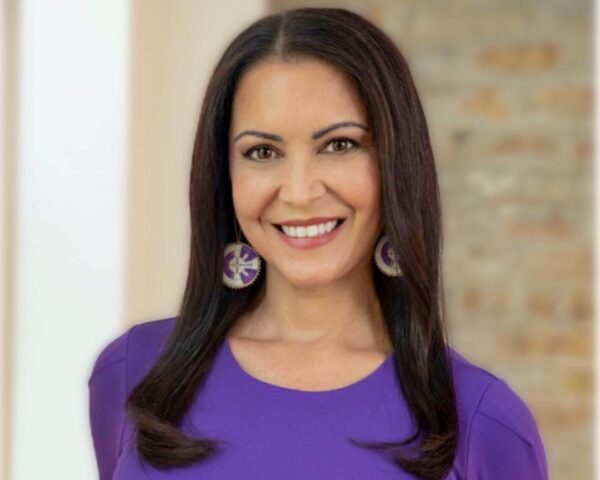Q&A with Kim Vigue, Executive Director, Mitchell Museum of the American Indian
The Project…
Mitchell Museum’s Community Medicine Garden
Location: Evanston, Illinois
The Mitchell Museum, in collaboration with Northwestern University ethnobotanist and anthropologist Dr. Eli Suzukovich (Little Shell Band of Chippewa-Cree/Krajina Serb), intends to start an Indigenous Medicine Garden in the summer of 2022 on its outdoor grounds. Throughout the project, Mitchell aims to provide all Native and non-Native participants with a greater understanding of the interconnectedness of food sovereignty, traditional wisdom, environment, and physical and behavioral wellness through traditional gardening. Kim Vigue of the Mitchell Museum is an enrolled citizen of the Oneida Nation and a descendant of the Menominee Tribe of Wisconsin.
The Organization…
 Mitchell Museum of the American Indian
Mitchell Museum of the American Indian
Founded in 1977, the Mitchell Museum of the American Indian’s mission is to promote and share a deeper understanding of Indigenous people’s histories, cultures, traditions, and contributions, both past and present.
Follow @mitchellmuseum: Website | Facebook | Instagram
@mitchelmuseum Event Highlights
- On May 11, 2022 we offered a free virtual artists discussion with Lakota artist, Rhonda Holy Bear. Learn more
- Next month, we kick off Pride Month by offering another virtual discussion to celebrate our LGBTQ-Two Spirit Relatives with Salish, two-spirit educator, Gary Neumann. Learn more
- July will be busy with a family day at the museum and storyteller performances in partnership with the Goodman Theater. Learn more
The Q&A…
Q1: How do you see the arts/culture/humanities as being essential?
 Kim Vigue: For Native people and communities, the arts have always been an integral part of every aspect of our lives and interwoven in our culture, spirituality, language, and traditional practices, including everything from music and dance to how we interact with our environment. Although colonization and assimilation policies were implemented to eliminate the expression of these traditional practices and art forms, we are now seeing a resurgence and revitalization of these cultural assets across urban, rural, and reservation-based communities. Not only is the renewal of culturally based arts and humanities among Native people healing for many from generations of oppression and trauma, but it also supports the intergenerational exchange and continuation of our cultures.
Kim Vigue: For Native people and communities, the arts have always been an integral part of every aspect of our lives and interwoven in our culture, spirituality, language, and traditional practices, including everything from music and dance to how we interact with our environment. Although colonization and assimilation policies were implemented to eliminate the expression of these traditional practices and art forms, we are now seeing a resurgence and revitalization of these cultural assets across urban, rural, and reservation-based communities. Not only is the renewal of culturally based arts and humanities among Native people healing for many from generations of oppression and trauma, but it also supports the intergenerational exchange and continuation of our cultures.
Q2: What is the most important thing people should know about your work?
Kim Vigue: The Mitchell Museum of the American Indian is located in Evanston, IL, one of a handful of cultural institutions that focus exclusively on the histories, cultures, traditions, and stories of Indigenous communities across North America. While the Chicagoland area has one of the country’s largest Native populations and was the ancestral home to dozens of tribes, Illinois doesn’t have any federally recognized tribes or reservations today. Because of the displacement and lack of reservation lands, the Native population in Illinois and United States is often invisible in history, education, public policy, etc. Most importantly, our goal is to bring visibility by providing a space for the Native communities and individuals to connect and share their authentic stories with visitors of all ages and the public in the Chicago area and beyond.
Q3: How did you arrive at doing what you do?
Kim Vigue: For as long as I can remember, I knew I had wanted to work with Native communities. After college, I chose a career in federal service in Washington, D.C. For nearly 20 years, I worked with several federal agencies and organizations serving Native communities on public health and education issues, primarily in behavioral health (suicide, substance abuse prevention, etc.) in D.C. When I relocated to this area in 2017, I started my own public relations firm advising government agencies and organizations on cultural competency, outreach, and engagement with Native communities. Last year, Mitchell Museum became one of my clients. I loved the mission and working with the board and staff and was offered the Executive Director position in October and jumped at the opportunity. I have been loving it since!
Q4: Who makes your work possible?
Kim Vigue: I have been lucky to come into an organization with fantastic staff, a supportive board, and dedicated volunteers who genuinely appreciate Indigenous cultures. Many donors and partners have been with the museum since its inception, and we are thrilled to see emerging support and appreciation for BICOP organizations more recently. This year, the museum reached a major milestone with a majority Native staff and board of directors for the first time in its 45-year history. With Native voices now at the forefront of our work, we are committed to growing our local and regional tribal partnerships to promote and share their stories with the public. We are very grateful for the support from Illinois Humanities that has allowed the museum to develop an online exhibit with local Ojibwe author and educator, Maria DesJarlait and begin the planting of an Indigenous Medicine Garden this month.
Suggested Readings by Kim Vigue:
Because Native people are faced with invisibility and referred to in the past tense, I am excited to see so many Native authors gain recognition for their work sharing contemporary experiences and stories. I highly recommend…
- There, There by Tommy Orange
- The Firekeeper’s Daughter by Angeline Boulley
- For educators or families wanting to learn more about Native Americans, the NNational Museum of the American Indian’s Native Knowledge 360 Education Initiative is fantastic and developed by Indigenous educators.
About The Illinois Humanities Grantee Partner Spotlight
Illinois Humanities highlights the work of our Community Grants program partners through our “Grantee Spotlight.” It shines the light on our grantee partner’s work, offering details about the organization and the funded project, as well as a Q&A with a team member at the organization. More: ILHumanities.org/Spotlight
About Illinois Humanities
Illinois Humanities, the Illinois affiliate of the National Endowment for the Humanities, is a statewide nonprofit organization that activates the humanities through free public programs, grants, and educational opportunities that foster reflection, spark conversation, build community and strengthen civic engagement. We provide free, high-quality humanities experiences throughout Illinois, particularly for communities of color, individuals living on low incomes, counties and towns in rural areas, small arts and cultural organizations, and communities highly impacted by mass incarceration. Founded in 1974, Illinois Humanities is supported by state, federal, and private funds.
Learn more at ilhumanities.org and on Facebook, Twitter, Instagram, and LinkedIn @ILHumanities.